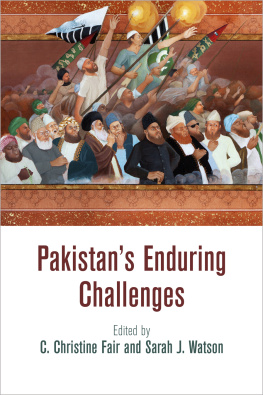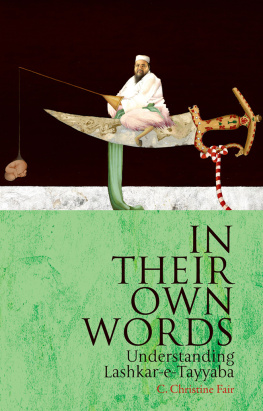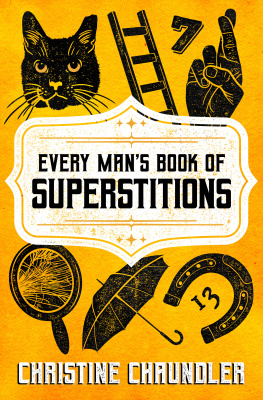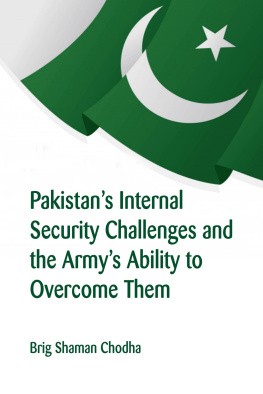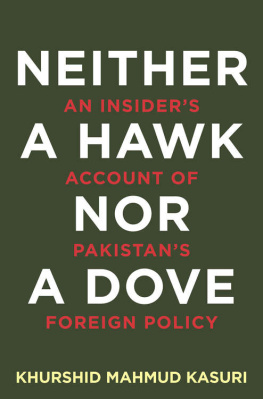Copyright 2015 University of Pennsylvania Press
All rights reserved. Except for brief quotations used for purposes of review or scholarly citation, none of this book may be reproduced in any form by any means without written permission from the publisher.
Published by
University of Pennsylvania Press
Philadelphia, Pennsylvania 19104-4112
Printed in the United States of America
on acid-free paper
10 9 8 7 6 5 4 3 2 1
Library of Congress Cataloging-in-Publication Data
Pakistans Enduring Challenges / edited by C. Christine Fair and Sarah J. Watson.1st ed.
p. cm.
ISBN 978-0-8122-4690-2 (hardcover : alk. paper)
1. PakistanPolitics and government21st century. 2. PakistanEconomic conditions21st century. 3. PakistanForeign relations21st century. 4. Political stabilityPakistan21st century. 5. Internal securityPakistan21st century. 6. Religious militantsPakistan21st century. 7. DemocracyPakistan21st century. 8. Military assistance, AmericanPakistan21st century. 9. PakistanMilitary relationsUnited States. 10. United StatesMilitary relationsPakistan. I. Fair, C. Christine. II. Watson, Sarah J.
DS389.A73 2015
954.9105'3dc23
2014029616
Introduction: Pakistans Enduring Challenges
C. Christine Fair and Sarah J. Watson
Pakistan on 9/11: From Pariah to Paladin
On September 10, 2001, Pakistan was virtually a pariah state. It was encumbered by layers of sanctions meant to punish it for, inter alia, nuclear and missile proliferation, its May 1998 nuclear tests (conducted almost immediately after those of India), and the 1999 bloodless coup in which Chief of Army Staff Pervez Musharraf overthrew the democratically elected government of Prime Minister Nawaz Sharif. The U.S. Department of State had even considered placing Pakistan on its list of countries that support terrorism. While Pakistan narrowly escaped designation as a state sponsor of terrorism, it did in fact support a vast fleet of Islamist militants waging a terror campaign throughout India, particularly in Indian-administered Kashmir, and it was providing key military, political, diplomatic, and other support to the Taliban regime in Afghanistan. When then U.S. President Bill Clinton visited the subcontinent in 2000, he spent several days in India, but in contrast, only a few hours in Pakistan. He took the opportunity to lecture Pakistani leaders on their reckless policies and even refused to shake the hand of General Musharraf, the countrys fourth military dictator. Prior to 9/11, the George W. Bush administration had embarked on a serious effort to reconfigure its relations with India and Pakistan. Whereas the United States sought to engage India in a significant strategic partnership, it was trying to prepare Pakistan to accept its unequal position in South Asia and diminished importance to the United States (Fair 2004; Tellis 2001: 88; Tellis 2008).
The tragic events of September 11, 2001, afforded Pakistan the opportunity to regain its standing among the community of nations and to force the United States to modify its plans to forge an entirely new policy in South Asia, one predicated upon moving boldly forward with India while helping Pakistan to accept its unequal and indeed inferior position in South Asia. Almost immediately, the United States had to find some way of releasing Pakistan from its burden of sanctions, both in order to secure the necessary Pakistani political will to support the looming war effort in Afghanistan and also to arm Pakistan, which wouldonce againbecome a frontline state in an American war. Virtually overnight, President Musharraf was transformed from yet another mango republic dictator into a much-feted partner of the free world and an intrepid cobelligerent in what became known as the war on terror.
Pakistans assistance was critical to the U.S. war in Afghanistan, launched on October 7, 2001, under the name Operation Enduring Freedom. Pakistan provided the United States with unprecedented access to ports, military bases, airspace, and ground lines of control, and Pakistani security forces also provided highly necessary security for U.S. assets positioned in Pakistan (Fair 2004). As the United States and NATO developed the Afghan theater, they freed themselves somewhat from their dependence on Pakistan. But Pakistan remained a crucial player in the war effort because the United States was unable to find a cost-effective alternative to trucking supplies into Afghanistan over Pakistani territory. Goods were offloaded at the Karachi port and then transferred onto thousands of privately owned local transport trucks for the trip into Afghanistan, either through the pass at Chaman (in Baluchistan) or through Torkham (in Khyber Pakhtunkhwa). As the war in Afghanistan drew on, Pakistan also became an indispensable partner in the drone program, which targeted al-Qaeda, the Taliban, and (ostensibly) their allied forces in Pakistan and Afghanistan.
President Musharraf benefited politically from his role in the war effort. Even as he became a greater and greater liability for the Pakistan army and as his policies vexed and alienated ever more Pakistanis, the United States redoubled its commitment to securing his place in Pakistans politics (Markey 2007). In order to keep him on as president while quieting critics of U.S. hypocrisy, the United States, working with the United Kingdom, helped broker a deal in 2007 that would allow Benazir Bhutto to return to Pakistan. The legislation that came about, the National Reconciliation Ordinance, offered her and her associates amnesty for any crimes committed during their previous spells in power, thus allowing them to contest elections. Musharraf would remain the president, with Benazir Bhutto as prime minister. The deal faltered when Bhutto was tragically assassinated in late 2007. Musharrafs career could not be resuscitated, and by the end of 2008, he had resigned from the position of the presidency and from the military (Wright and Kessler 2007; Sehbai 2011). Even though the 2008 elections ushered in a civilian government led by the Pakistan Peoples Party, the United States focused instead on Ashfaq Parvez Kayani, Musharrafs successor as chief of army staff.
For the first five or six years of the war, Washington was relatively pleased with Pakistans cooperation. President Bush would frequently cite the various al-Qaeda operatives who had been captured with Pakistani help as proof of Musharrafs dedication to the war. When al-Qaeda began targeting President Musharraf in 2004 for this very cooperation, Washington worked even harder to support him and his army (Vandehei and Lancaster 2006). Between fiscal years 2002 and 2008, the United States provided Pakistan some $2.2 billion in security-related assistance and $3.2 billion in economic aid. These figures paled, however, in comparison to the $6.7 billion that the United States transferred to Pakistan under the Coalition Support Funds (CSF) program, under which the United States reimbursed Pakistan for its expenditures on the war on terror in the same period (Congressional Research Service 2014). The terms of reimbursement under this program were absurdly favorable and subject to very little oversight (GAO 2008a).


